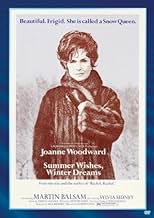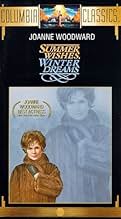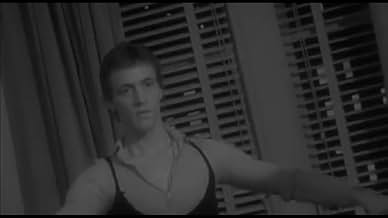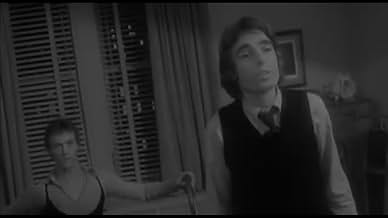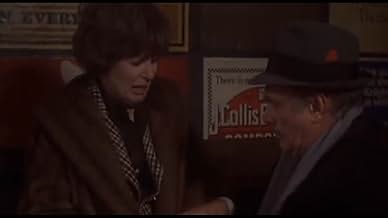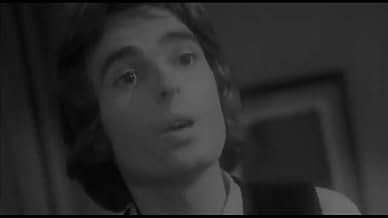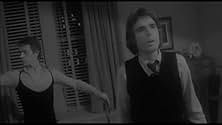Rita, a middle aged New York City homemaker, finds herself in an emotional crisis which forces her to re-examine her life, as well as her relationships with her mother, her eye doctor husban... Read allRita, a middle aged New York City homemaker, finds herself in an emotional crisis which forces her to re-examine her life, as well as her relationships with her mother, her eye doctor husband, her alienated daughter and estranged son.Rita, a middle aged New York City homemaker, finds herself in an emotional crisis which forces her to re-examine her life, as well as her relationships with her mother, her eye doctor husband, her alienated daughter and estranged son.
- Nominated for 2 Oscars
- 5 wins & 8 nominations total
Nancy Andrews
- Mrs. Hungerford
- (voice)
Charlotte Oberley
- Waitress
- (as Charlet Oberley)
- Director
- Writer
- All cast & crew
- Production, box office & more at IMDbPro
6.3906
1
2
3
4
5
6
7
8
9
10
Featured reviews
Beautiful, but studio interference lessened its impact
Having worked on "Summer Wishes, Winter Dreams" 50 years ago as the Unit Publicist (that's the person who is in charge of a movie's publicity while it is being filmed), this was only my third job in this field, and remains my absolute favorite. During the 3-month shoot, I actually became friends with several members of the cast and crew, the nicest, most harmonious group of people I had ever worked with. I had always been a fan of Joanne Woodward, who went out of her way to be kind to me and we kept in touch for several years after the movie wrapped. She was completely down-to-earth, warm-hearted, had a terrific sense of humor, and was far more beautiful in person than she was ever allowed to be in most of her movies. Stewart Stern was a lovely man, a brilliant writer, and we also remained friends. The director, Gil Cates, gave everyone a beautiful sterling-silver Tiffanys key chain at the wrap party and when he screened the movie for us after he had finished editing it, I honestly thought it would be acclaimed as one of 1973's finest, award-winning films. The running time of Cates' cut was 112 minutes which, to me, seemed perfect. Unfortunately, as was a custom in those bygone days, the studio had a "sneak preview" of the movie at a theater in New Jersey that was showing a raucous slapstick comedy so the audience was in no mood to watch a serious, emotional drama like SWWD and the cards they filled out were mostly unfavorable. But Columbia took this nonsense seriously and ordered the movie's creative team to cut the movie down to a more "palatable" 90 minutes. Reluctantly, the director and writer (Cates & Stern) went back to the editing room and when I saw the 92-minute release print, I was horrified. Far too many crucial scenes had either been deleted or shortened, and Sylvia Sidney's scenes were so drastically shortened that her screen time now amounted to little more than 5 minutes! Of course I was thrilled to receive my first screen credit, but somehow the fact that my name was misspelled seemed appropriate! Despite the studio's butchery, "Summer Wishes, Winter Dreams" still pleased most critics and won a few awards, but I still can't help think how much more enthusiastic its reception would have been had the far more nuanced 112-minute version been released. Scott MacDonough 1/28/2023
January 29, 2023 at 3:29 AM.
January 29, 2023 at 3:29 AM.
Springs Foreword, Falls Back
In wintry New York City, attractive middle-aged Joanne Woodward (as Rita) awakens from nightmare. After battling insomnia, Ms. Woodward arranges to meet nicotine-stained mother Sylvia Sidney for lunch. The bickering mother and daughter suggest complaining may be an inherited trait. Woodward fears she's going blind, but husband Martin Balsam (as Harry Walden), conveniently an eye doctor, discovers his wife needs reading glasses. Keeping herself busy, Woodward babysits a crying grandson and sees a revival of Ingmar Bergman's "Wild Strawberries" with Ms. Sidney. During black-and-white movies, Woodward dreams in black-and-white. An unhappy event forces Woodward to reexamine her life. To help, Mr. Balsam takes his wife on a European trip...
"Summer Wishes, Winter Dreams" is a dreary story about an unlikable woman. Masterpieces may fit that description, but this isn't one of them...
The characters and story are rich, but undeveloped. The camera follows when it should lead and a few edits appear to favor scenery at the expense of characters. Most pointedly, Woodward's whimpering epiphany is inadequate. She never gets to let her hair down. Still, it's a good film. The acting is universally excellent. Woodward and Sidney won major acting awards. Balsam is just as good. Writer Stewart Stern does best with a secondary story involving Balsam's character, a World War II veteran. Self-identified "fat" daughter Dori Brenner (as Anna) and her aunt Tresa Hughes (as Betty) are brief, but memorable. Director Gilbert Cates artfully introduces Woodward's estranged son Ron Richards (as Bobby) in the opening nightmare, then, he is regulated to dreams.
****** Summer Wishes, Winter Dreams (10/21/1973) Gilbert Cates ~ Joanne Woodward, Martin Balsam, Sylvia Sidney, Dori Brenner
"Summer Wishes, Winter Dreams" is a dreary story about an unlikable woman. Masterpieces may fit that description, but this isn't one of them...
The characters and story are rich, but undeveloped. The camera follows when it should lead and a few edits appear to favor scenery at the expense of characters. Most pointedly, Woodward's whimpering epiphany is inadequate. She never gets to let her hair down. Still, it's a good film. The acting is universally excellent. Woodward and Sidney won major acting awards. Balsam is just as good. Writer Stewart Stern does best with a secondary story involving Balsam's character, a World War II veteran. Self-identified "fat" daughter Dori Brenner (as Anna) and her aunt Tresa Hughes (as Betty) are brief, but memorable. Director Gilbert Cates artfully introduces Woodward's estranged son Ron Richards (as Bobby) in the opening nightmare, then, he is regulated to dreams.
****** Summer Wishes, Winter Dreams (10/21/1973) Gilbert Cates ~ Joanne Woodward, Martin Balsam, Sylvia Sidney, Dori Brenner
Marvelous acting
By the early 1970's, films had become more personal and character studies were emerging on the screen. Such is the case with "Summer Wishes, Winter Dreams." At first glance, the film seems to be about Rita (Joanne Woodward) coping with the sudden and awful death of her mother (the wonderful Sylvia Sidney). The film then shifts to the apparently empty marriage between Rita and her husband Harry (Martin Balsam). They travel to Europe, where emotions and past resentments come to the foreground. Rita has much guilt about her son, who apparently wants nothing to do with her or Harry - we find out he is gay, but never the exact reasons why he can't stand either of them! (The son is seen only in flashbacks). Harry has a very emotional reaction while visiting Bastogne, where he fought in WWII. Rita has a breakdown in a London subway tunnel, apparently imaging she has seen her dead mother. Harry and Rita's daughter seems to have no purpose in the film except to be sanctimonious and shrill. This is not a perfect film, and at times the script jumps around. There are a few things that don't quite jive. There seems to be a lot of Freudian type psycho babble in the film (which was popular at the time). But it is the fine performance of Joanne Woodward that shines here. Ms. Woodward is one of the best actresses ever to grace the American cinema. Martin Balsam is in fine form here too. A quiet little film worth watching.
Dealing with an emotional crisis
With a great performance by Joanne Woodward as a middle aged New York woman named Rita Walden going through an emotional crisis, this movie is a true original. Directed by Gilbert Cates, it shows one woman's strained family relationships as the movie goes from one scene to another where she interacts with the other characters in a series of interesting vignettes.
Rita's mother is played by Sylvia Sidney, whose career dated back to 1929 and her husband Harry, an ophthalmologist, is Martin Balsam, one of the most versatile and recognizable of actors. We see imaginary encounters that go through her mind. The opening scene is a jaw dropper. Another of theses occurs in the New York subway station as she imagines her mother and grandparents looking at her from an escalator. I didn't find these flashbacks particularly relevant to the story and they seemed jarring in an otherwise irresistible movie.
We find Rita shopping in the streets of downtown New York near Washington Square with her energetic, 73 year old mother and then stopping off at a theatre to watch a Bergman movie. The scene shifts to a cemetery covered with brown leaves in the autumn mist as the family bickers over the estate before the deceased is even in the ground. Then on a trip to France with her husband she wanders through a muddy French village where her husband fought in the war. It is here that her husband shares stories that have haunted him for 30 years.
Silvia Sydney is superb in the first part of the movie as a mother with a youthful zest for life, a sharp contrast to her daughter. Martin Balsam is the steadying force in her life but relives his own dark shadows on returning to a former theatre of war in France. Of course, it is Joanne Woodward's role that is critical to the story and she is excellent.
Rita's mother is played by Sylvia Sidney, whose career dated back to 1929 and her husband Harry, an ophthalmologist, is Martin Balsam, one of the most versatile and recognizable of actors. We see imaginary encounters that go through her mind. The opening scene is a jaw dropper. Another of theses occurs in the New York subway station as she imagines her mother and grandparents looking at her from an escalator. I didn't find these flashbacks particularly relevant to the story and they seemed jarring in an otherwise irresistible movie.
We find Rita shopping in the streets of downtown New York near Washington Square with her energetic, 73 year old mother and then stopping off at a theatre to watch a Bergman movie. The scene shifts to a cemetery covered with brown leaves in the autumn mist as the family bickers over the estate before the deceased is even in the ground. Then on a trip to France with her husband she wanders through a muddy French village where her husband fought in the war. It is here that her husband shares stories that have haunted him for 30 years.
Silvia Sydney is superb in the first part of the movie as a mother with a youthful zest for life, a sharp contrast to her daughter. Martin Balsam is the steadying force in her life but relives his own dark shadows on returning to a former theatre of war in France. Of course, it is Joanne Woodward's role that is critical to the story and she is excellent.
Intimate strangers, unfamiliar relations...
Uptight, possibly frigid, panic-stricken middle-aged New York housewife has to learn to let go of the past, a refuge which doesn't necessarily bring her happiness but does provide her life with some kind of stability. Joanne Woodward gives a good performance here; not at all vain, and unafraid to let herself be pinchy, selfish, or even annoyingly helpless, Woodward overcomes this rather dreary "woman's picture" material with thoughtful touches and nuances. It's a heavy load however, and she doesn't have much help until the final reel when her needling, provoking matron takes a European trip with her husband (Martin Balsam, also doing fine work) and she comes to see her humanity as something she can work with as opposed to frittering it away. Screenwriter Stewart Stern's dialogue is heavy with a writer's pretensions, and often the chit-chat is pedantic, forced and unreal. Near the beginning, Woodward gets a phone call from her mother and asks, "Who is this?" A few scenes later, Woodward becomes exasperated with her husband and asks, "How many years have we been married?" These moldy exchanges are lazy outs for a writer wanting to introduce us to the characters; instead of letting us discover these people and their hang-ups for ourselves, everything is spelled out (and poorly so). We are to understand that Joanne's estranged son is gay after she has a dream in which a male dancer is caught in the boy's bedroom--in ballet tights! The 'colorless' color cinematography is a mix of putrid browns and greens, and director Gilbert Cates begins each new sequence with a big wind-up, as if the movie were starting all over again. The rhythm is off, and with lines like "You approach every new relationship like you would a toll-booth, Mrs. Santa Claus!", one doesn't know how to respond to the characters. It's possible that some of Woodward's jaunts to her past, both real and imaginary, will strike some viewers as very personal, but the film isn't especially moving, at least not until the final third. **1/2 from ****
Did you know
- TriviaFeatures Sylvia Sidney's only Oscar-nominated performance.
- GoofsWhen the gurney is wheeled out of the ER, the sheet over the body is relatively flat. When Rita is next to the gurney, the sheet is elevated due to the body's arms being across the body.
- Quotes
Mrs. Pritchard - Rita's Mother: I thought I was having a heart attack.
- ConnectionsFeatured in Oscars, Actors and The Exorcist (1974)
- SoundtracksWhere is your Heart
(Moulin Rouge)
Music by Georges Auric
French lyrics by Jacques Larue
English lyrics by William Engvick
- How long is Summer Wishes, Winter Dreams?Powered by Alexa
Details
Contribute to this page
Suggest an edit or add missing content

